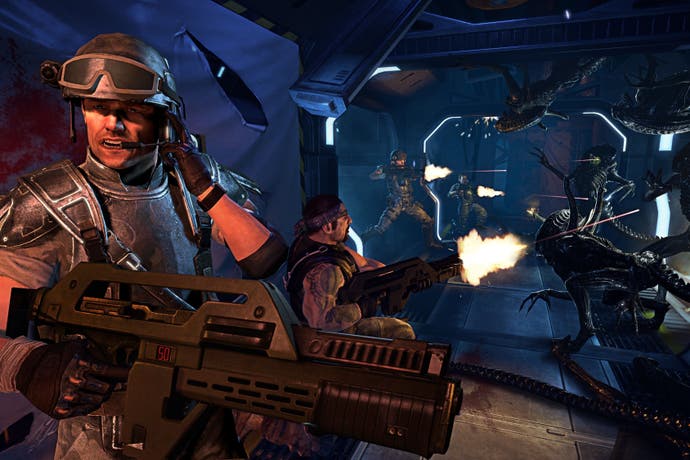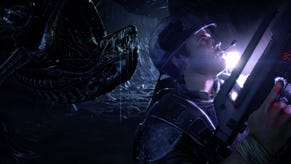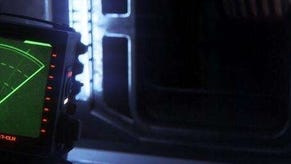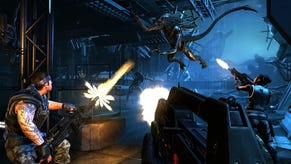Several staffers on Aliens: Colonial Marines spill the beans on what went wrong - report
"The game feels like it was made in nine months, and that's because it was."
Aliens: Colonial Marines is heavily regarded as one of the biggest train wrecks in gaming history. Criticisms have run rampant from its shoddy critical reception to gamers crying afoul of its pre-release demo not being at all representative of the final product. While publisher Sega and developers Gearbox and TimeGate haven't officially responded to the game's poor reception - and are probably buried under a mountain of non-disclosure agreements - several staffers agreed to anonymously speak to Kotaku to outline what went wrong with the highly-anticipated sci-fi shooter.
It began when Sega purchased the rights to make two Alien games in 2006: an RPG from Obsidian, and an FPS from Gearbox, who was then mostly known for developing Brothers in Arms and Half-Life expansions Opposing Force and Blue Shift. Unfortunately, Sega wasn't doing so hot financially in 2009 and it had to cut its RPG loose. (Curiously, no mention is made of Sega's pretty good 2011 DS game, Aliens: Infestation).
It was around this time that Gearbox made it to the big-time with Borderlands, a massive critical success that exceeded the studio's sales expectations. It then decided to focus all of its attention on Borderlands 2, so it outsourced the Aliens game to Section 8: Prejudice developer TimeGate in November 2010.
"There was really good synergy between both teams about what needed to happen... It was a very love-love situation," said one anonymous source. "Everyone at [TimeGate] was pretty stoked," said another.
This "love-love situation" changed when TimeGate began to work on Colonial Marines - then codenamed Pecan - as it became apparent that Gearbox had ignored the game for years. According to three staffers, Gearbox had focused the vast majority of its efforts on Duke Nukem Forever, Borderlands, and Borderlands 2.
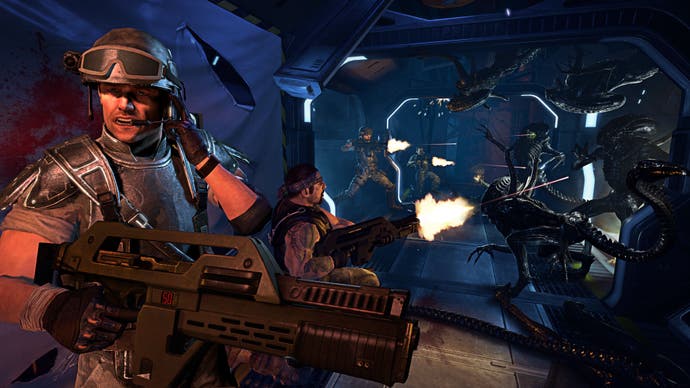
"There was obviously not four years of work done on the game," said one source. Apparently what Gearbox gave TimeGate was a merely a collection of assets with little rhyme or reason to how it was all planned to come together. "A lot of assets just didn't seem like they fit there," the source noted.
It's unclear exactly how much of Gearbox's work TimeGate was able to salvage with one source claiming that the studio decided to start fresh while another said that it had to heavily reiterate the scraps that it inherited.
By all accounts, TimeGate was the only developer actively working on Colonial Marines starting at the end of 2010.
Perhaps the biggest thing TimeGate didn't have when it began developing the game was a script. According to three sources, narrative designers at Gearbox and TimeGate were constantly writing and rewriting the game, causing the designers to discard entire levels. "For a couple months, we were just kind of guessing," said one source. "It's really weird to work on a game when you don't have a basic idea of how things will work."
One source claimed that Sega wanted the game to feel like Call of Duty, with more human combat and less riddling bugs with bullets. Neither studio agreed with this notion.
"There was also the 'too many chefs' syndrome when it came to gameplay, where too many people gave feedback on both ends and it ultimately led to further delays," said a source. "In one case, working on a particular task took me a month to finalise, as there was inconsistent and delayed feedback."
Both Gearbox and TimeGate also operated very differently. "You could not pick two companies whose general workflow is more diametrically opposed," said one source. "Gearbox is used to 'work, work, work, iterate, iterate.' TimeGate is the exact opposite - they're always about shipping the product."
Apparently one scrapped mission involved a scientist following the player around who would turn out to be a spy for malevolent military corporation Weyland Yutani, but this stage was scrapped "because escort missions are stupid," said a source. "We just spent a lot of time trying to make the game shippable."
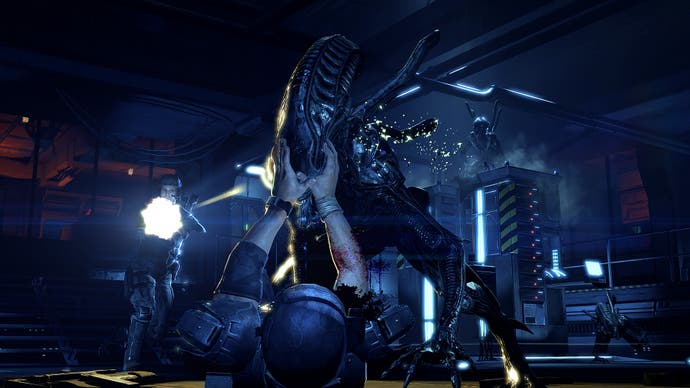
Regarding Colonial Marines' more-impressive-than-the-final-game demo, this was built by TimeGate with some animation by Gearbox and it actually was running in real-time, only on a suped up PC that was far more advanced than what an average consumer would own. This is actually customary for games at trade shows, even if the results don't usually reveal such a discrepancy.
"We were told many times through demo production, 'Don't worry about performance, just make it awesome,'" said one source. "There was a reason [the demos] were never playable."
The game later had to be optimised for consumer PCs. "We were constantly cutting back more and more in terms of texture, shader and particle fidelity, in order to fit into the jacked memory restraints," said another source.
When Gearbox finally took the reins back on Aliens: Colonial Marines last summer it had to change everything, as according to two sources, what TimeGate delivered wasn't very good and couldn't run on PS3. Uh oh!
According to a source who had not played the final game, but was familiar with its later builds said, "[Gearbox made] big changes to lighting, texture and shader complexity... Design elements were altered or redone entirely. It looks like a lot of [TimeGate's] assets remained intact, with the exception of lower-res textures and faster-performing shaders."
A source at Gearbox said the studio knew the game was a disaster, but it couldn't ask for another extension from Sega. Not after six years. So Gearbox had to pick up the discordant pieces with only nine months to go before launch.
"The game feels like it was made in nine months," said a source who worked on the project. "That's because it was."
You can read the full story in Jason Schreier's excellent report on Kotaku.
